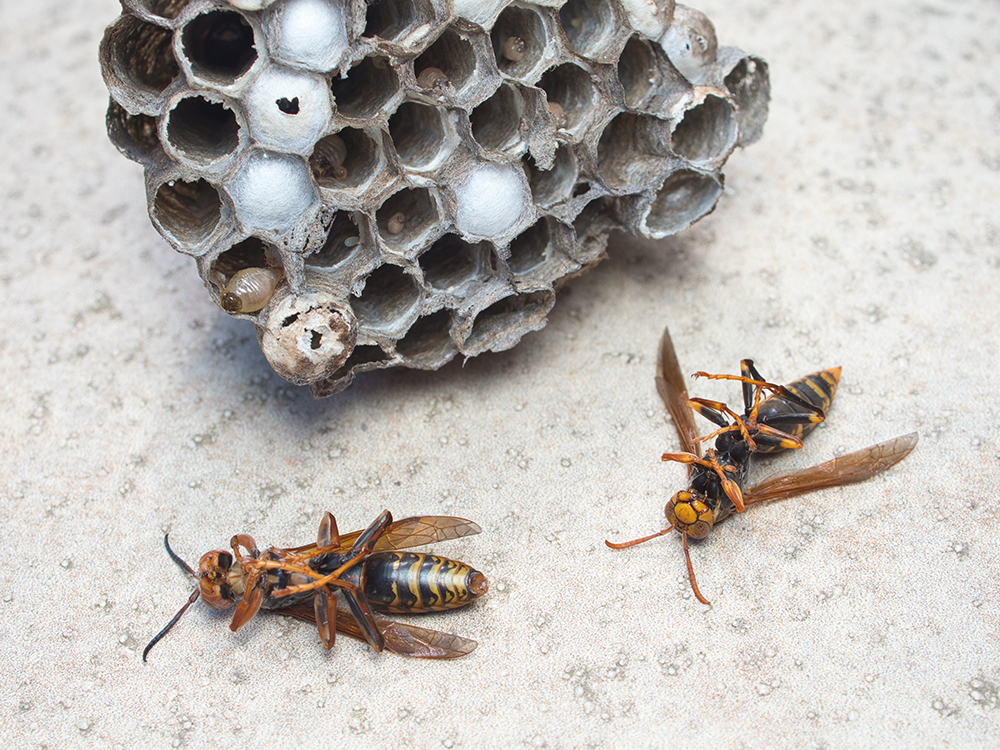It’s a perfect summer day in New England—you step outside with an iced coffee, only to hear that unmistakable buzz. Wasps. Again. If it feels like you’re stuck in a Groundhog Day loop of wasp nests on your eaves, under your deck, or in your shrubs, you’re not imagining things. You are going to need to remove a wasp nest. Wasps are territorial and strategic, and once your home has proven a good nesting ground, they’ll come back season after season.
But why your house—and what can you do about it?
1. Why Do Wasps Nest Near Homes in the First Place?
Wasps love predictable shelter. You’re an easy target and you will find yourself needing to remove a wasps nest if your property has any of the following, :
• Eaves, roof overhangs, and porches (especially those with gaps)
• Sheds or garages left partially open
• Hollow trees or thick shrubbery
• Readily available food and water sources
Homes in tree-lined areas like Amesbury, Newburyport, or Wenham often see elevated wasp activity because the local environment is ideal. If your neighbor also has a nest, they may be swarming near your property too.
2. Are Wasps Dangerous?
Yes—especially when disturbed. While most wasps don’t sting unless provoked, they’re extremely protective of their nests. A simple mistake, like slamming a door or trimming a bush, can lead to painful stings.
People allergic to wasp venom can go into anaphylactic shock with just one sting. Don’t assume your risk is low just because “they haven’t stung you yet.”
3. What NOT to Do: DIY Wasp Nest Removal
We get it—you’ve got a garden hose, a broomstick, and maybe a can of spray. But trying to remove a wasp nest yourself is a gamble, especially if you:
• Can’t identify the species (yellowjackets are highly aggressive)
• Can’t reach the nest safely
• Try to remove it during the day when wasps are most active
And let’s not forget—you’re likely not removing the pheromones or environmental cues that attracted them in the first place. You may knock down one nest, but another will likely pop up in its place.

4. Proven Ways to Keep Wasps Away (Without Going to War)
Preventative strategies go a long way in reducing future nests:
• Seal small gaps under your siding, eaves, and attic vents
• Clean up food waste from grills, compost bins, or trash cans
• Use natural wasp-repellent plants like spearmint, eucalyptus, and citronella
These methods, paired with professional inspection, significantly reduce your risk of new nests forming.
5. When to Call a Wasp Removal Specialist in Massachusetts
If you’re in Hamilton, Newburyport, Amesbury, or anywhere along the North Shore, our team at Safer Nature Pest Control is here to help. Our wasp removal process is:
• Fast and safe for your family and pets
• Focused on long-term prevention, not just temporary relief
• Backed by environmentally responsible methods
We’re local, licensed, and familiar with the seasonal wasp cycles in Massachusetts towns like Danvers, Boxford, and Reading. We’ll assess your property and apply a custom treatment plan so you can reclaim your backyard—without the buzz.
6. Learn More or Book Service
Explore our Service Area Pages to see if we serve your town, or read more on our blog about summer pest threats in New England.
